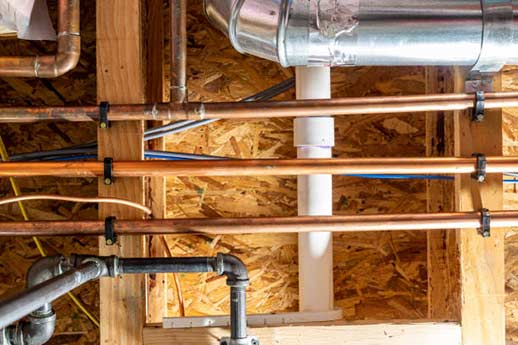
Although they practically make your home livable by carrying water to and from the house, your building’s plumbing network probably needs to be addressed. That’s because, despite its massive size, most of the pipes in the system are entirely out of sight.
Because they are buried in the ground or hidden inside the walls of your house, the BRS Management team, it is very easy to overlook plumbing pipes when doing general maintenance. Even worse, some homeowners wrongly assume that plumbing pipes are so sturdy that they do not need to go out of their way to look after them.
This belief is completely false. Like any other home feature, your plumbing pipes are vulnerable to wear and tear. Plumbing pipes are even more susceptible to wear because of their environment. These pipes transport water and are often underground.
Consequently, your home’s plumbing pipes are constantly subject to the corrosive effects of the water inside them and the forces of degradation in the surrounding soil. The combination of these factors is why those plumbing pipes wear out after some years and need replacement.
But the big question is, how do you know when it is time to replace the plumbing pipes in your home? Or should you wait until the pipes fail before replacing them? The trouble with waiting until your pipes fail is that you often have to fix other problems caused by the pipe failure. The easier way is to learn the signs of an impending in your plumbing system.
Critical signs that your plumbing pipes should be replaced
The pipes are old
Plumbing pipes have a 40 – 100-year lifespan, depending on the material and the environment where they are laid. The typical lifespan for different kinds of pipe materials is as follows: brass (40-70 years), copper (50+ years), cast iron (75-100 years), and PVC (100+ years). Check your home’s maintenance records to know the kind of pipes you have and how old they are.
You have frequent leaks
If your pipes leak frequently, it could be a sign that the pipes and pipe connections have become weak. Pipes can sometimes become fragile before they end their useful life. That may happen if the pipes are exposed to highly corrosive soil or water. If your pipes leak frequently, you could save money by replacing them instead of repairing them.
Reduced water pressure
There are two ways aging water pipes can affect the water pressure in your home: Mineral deposits can build up on the inner surface of pipes, reducing their internal diameter and slowing the rate at which water flows. Leaks in your pipes can also affect the water pressure in your home by letting water escape from the system.
Water quality issues
Aging pipes can also affect the quality of water entering your home. For instance, metal pipes, such as lead pipes, can leach dangerous metals into your home’s water supply. If there is a lot of corrosion and deposits inside the pipes, it may alter the water’s color, taste, and smell. Soil and bacteria may also find their way into the water through cracks in the walls of your home’s aged piping.
Why should you replace your old plumbing pipes?
Reduce maintenance costs
Newer pipes cut the time, money, and effort spent fixing leaks and clogs. Additionally, you can eliminate the cost of fixing water damage caused by those broken pipes.
Lower heating costs
Modern pipes such as PVC and CPVC can maintain water temperature during transit. This reduction in heating costs can result in significant energy savings each year.
Prevent wear and tear
Leaky pipes can cause constant water damage and mold growth, accelerating the deterioration of a building’s features. New plumbing pipes will not subject your home to this risk.
Compliance with building codes
Building codes and regulations are constantly being updated. Replacing your home’s plumbing pipes will allow you to bring your property up to code.
Improved property value
Newly installed plumbing improves a home’s appeal and market value. Buyers are willing to pay more for the peace of mind that comes with new pipes.
To conclude, is there a way to detect the actual condition of your home’s plumbing without waiting for any of the signs above? There is. By having your entire plumbing system inspected yearly by a professional plumber, you can preempt problems in the system.
Scheduled plumbing inspections by a professional plumber will allow you to see problems in the system before they become significant issues. By having your plumbing evaluated regularly, you can start planning and preparing beforehand for the eventual replacement of your pipes.